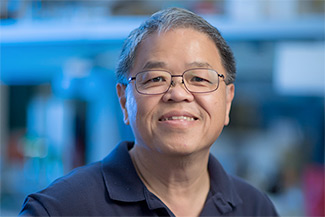UNC Researchers Awarded $11.3 Million for Cancer Nanotechnology Research
University of North Carolina at Chapel Hill researchers received an $11.3 million, five-year grant to conduct multiple studies exploring the use of nanoparticles to create cancer vaccines and improve cancer drug delivery and responses.
The grant is the third in a series of awards that the university has received from the National Cancer Institute for cancer nanotechnology research. It will fund work by researchers with the Carolina Center of Cancer Nanotechnology Excellence, an NCI-funded collaboration between UNC-Chapel Hill and the UNC Lineberger Comprehensive Cancer Center.

“UNC-Chapel Hill has emerged as a leader in nanotechnology in the last 10 years,” said Leaf Huang, Ph.D., a UNC Lineberger member, Fred Eshelman Distinguished Professor and chair of the UNC Eshelman School of Pharmacy Division of Molecular Therapeutics, and the co-leader of the CCCNE. “This grant is a testament to the quality of our research in using nanotechnology to continue to find innovative ways to fight cancer.”
The grant will fund four different studies into the use of nanotechnology to fight cancer.
The first project will be a study of nanoparticles to create a vaccine that would train the body’s immune system to recognize and fight drug-resistant melanoma. The project is led by Huang, William Kim, M.D., a UNC Lineberger member and associate professor of medicine and genetics in the UNC School of Medicine, and Jenny Ting, Ph.D., a UNC Lineberger member and the UNC William R. Kenan Jr. Distinguished Professor in the UNC School of Medicine.
The second project will involve using nanoparticles to develop a vaccine for advanced melanoma. The concept is to use nanoparticles to deliver drugs targeting molecules in the tumor’s microenvironment. Specifically, the nanoparticles would target molecules that would help immune cells destroy cancerous cells. The project is led by Ting, Joseph DeSimone, Ph.D., Chancellor’s Eminent Professor Chemistry, and Jon Serody, M.D., associate director of translational science at UNC Lineberger and a medical oncologist in the UNC Lineberger Leukemia and Lymphoma Program.
Andrew Wang, MD, a UNC Lineberger member and an associate professor in the UNC School of Medicine Department of Radiation Oncology and UNC Eshelman School of Pharmacy, Serody, and Joel Tepper, M.D., Hector MacLean Distinguished Professor of Cancer Research in Radiation Oncology and co-leader of CCCNE, are leading the third project. Their study will involve using nanotechnology and radiation therapy to try to improve patient responses to certain cancer drugs. Specifically, the study will aim to improve responses to cancer immunotherapy checkpoint blockade agents in melanoma, Wang said.
And in the final project, researchers will use a capsule made using nanoparticles to more effectively load and deliver cancer drugs. The project is led by Alexander Kabanov, Ph.D., D.Sc., Mescal Swain Ferguson Distinguished Professor in the UNC Eshelman School of Pharmacy and director of the UNC Center for Nanotechnology in Drug Delivery; Chad Pecot, M.D., a UNC Lineberger member and assistant professor in the UNC School of Medicine; and Wang.
Originally posted at UNC School of Pharmacy
- Created on .